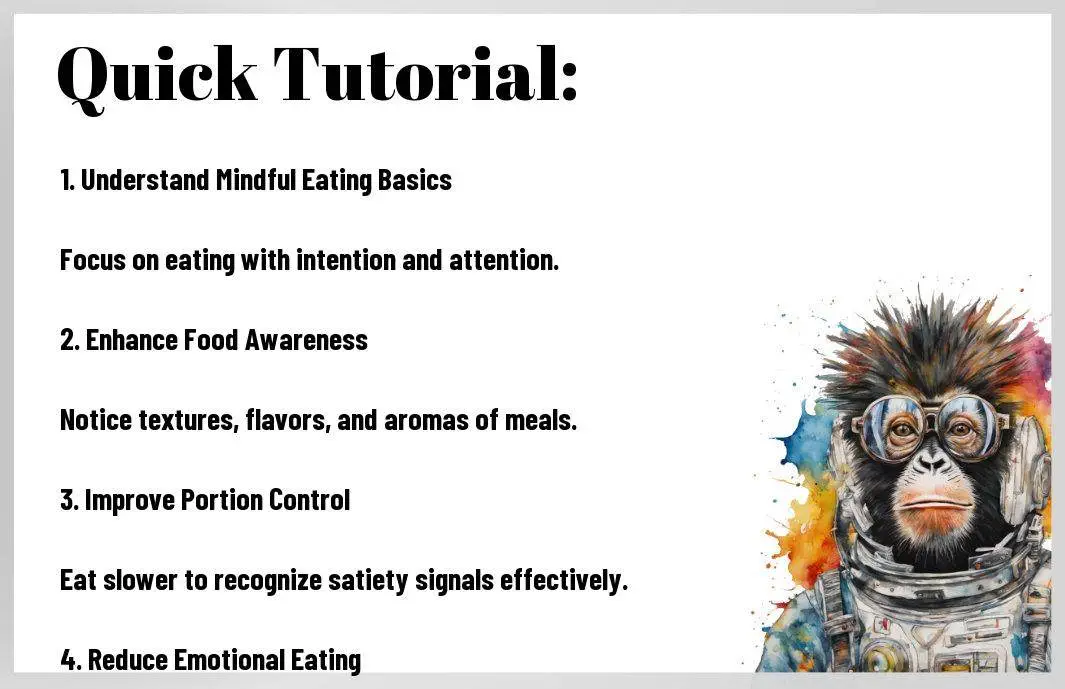What Are The Benefits Of Mindful Eating For Your Nutrition And Healthy Diets?
Inculcating mindful eating into your daily routine can profoundly enhance your approach to nutrition and healthy diets. By being present during meals, you cultivate a deeper awareness of your body’s hunger cues and food choices, allowing you to foster a more balanced relationship with food. This tutorial explores the myriad benefits of mindful eating, empowering you to nourish your body and improve your overall well-being. Discover how adopting this practice can lead to better digestion, weight management, and greater satisfaction with your meals.
Understanding Mindful Eating
The practice of mindful eating encourages you to develop a deeper awareness of your eating habits and the sensations associated with food consumption. It invites you to focus on the experience of eating, promoting a healthy relationship with food that can enhance your nutrition and overall well-being. By tuning into your body’s signals and savoring each bite, you cultivate an intentional approach to nourishment.
Definition of Mindful Eating
To engage in mindful eating is to bring your full attention to the process of eating, acknowledging your hunger cues and the flavors, textures, and aromas of your food. This practice encourages you to slow down, appreciate your meals, and make conscious food choices that align with your nutritional goals.
Historical Background and Its Evolution
Clearly, the concept of mindful eating has roots in ancient meditation practices and philosophies, particularly within Buddhist traditions. Over time, it has evolved beyond spirituality into a practical approach for promoting healthier eating habits. As awareness of nutrition and wellness has increased, so has the recognition of the benefits of mindfulness in dietary practices, reflecting a shift towards holistic health.
A growing body of research has shown that integrating mindfulness into your eating habits can lead to improved digestion, reduced overeating, and a greater appreciation for the food you consume. The recognition of the mind-body connection has also contributed to the popularity of mindful eating as an important practice in nutrition and dietary health. This evolution mirrors societal changes towards greater individual health consciousness and an emphasis on self-care, making mindful eating not just a trend but a valuable lifestyle approach.

Benefits of Mindful Eating
Any approach that promotes mindful eating can lead to significant benefits for your nutrition and overall health. By focusing on your eating experiences, you can enhance your appreciation for food, make healthier choices, and foster a better relationship with what you consume. Mindful eating encourages you to be present during meals, which in turn can optimize your health outcomes and help you maintain a balanced diet.
Improved Digestion and Nutrient Absorption
While you engage in mindful eating, you naturally slow down your eating pace and pay closer attention to your body’s signals. This mindful approach allows your digestive system to function more efficiently, breaking down food more effectively and facilitating better nutrient absorption. As a result, you may find that your body feels lighter and more energized.
Enhanced Emotional Well-being
The focus on mindful eating can lead to an improved emotional relationship with food. By tuning into your hunger cues and emotional triggers, you foster a sense of awareness and acceptance regarding your eating habits. This conscious approach minimizes feelings of guilt or shame associated with certain foods, enhancing your overall mental and emotional wellness as a result.
It also allows you to explore your emotions more deeply, helping you to identify how specific foods affect your mood and energy levels. By practicing mindfulness, you can shift your focus from external pressures to your internal needs, which reduces stress and promotes a healthier mindset toward eating.
Better Weight Management
For those looking to manage their weight effectively, mindful eating can be a powerful tool. By paying attention to your hunger and satisfaction levels, you can make more informed choices about portion sizes and the types of foods you consume. This increased awareness helps you avoid overeating and encourages you to choose healthier options more consistently.
Eating mindfully allows you to connect with your body’s natural signals, making it easier to recognize when you are truly hungry versus eating out of boredom or emotional stress. This practice can empower you to create lasting habits that not only help with weight management but also contribute to a more balanced and healthy lifestyle overall.
Practicing Mindful Eating
For successful mindful eating, you need to cultivate awareness and engagement with your meals. This practice encourages you to savor each bite, focusing on the flavors, textures, and smells of your food. By putting away distractions—like your phone or television—you can truly connect with your meal, enhancing your overall eating experience while promoting better digestion and satisfaction.
Techniques to Incorporate Mindful Eating
Eating slowly and deliberately can help you truly appreciate what you consume. Try placing your utensils down between bites, allowing your body to recognize feelings of fullness. Additionally, engage your senses by noticing the colors, aromas, and sensations of your food. This mindfulness turns eating into a more enjoyable and fulfilling experience, leading to healthier choices.
Creating a Mindful Eating Environment
Environment plays a significant role in your mindful eating practice. A clutter-free and serene dining space can enhance your focus on the meal at hand. Dim lighting, calming music, and inviting table settings can foster a calm atmosphere that encourages you to engage fully with your food and companions.
Plus, consider eliminating distractions in your eating space. Create a pleasant ambiance by using your favorite tableware and setting the table thoughtfully. This can transform meals into sacred rituals, enhancing your connection to food and promoting healthier eating habits. By consciously crafting your environment, you encourage a deeper awareness that supports mindful eating practices.
Common Challenges in Mindful Eating
Once again, the journey towards mindful eating can present several challenges that may hinder your progress. You may find yourself grappling with distractions during mealtime or responding to emotional cues that drive you to eat. Understanding these common pitfalls is imperative for improving your relationship with food and cultivating a healthier eating pattern.
Addressing Distractions
To truly engage in mindful eating, you need to eliminate distractions that may interfere with your ability to focus on your meals. This can include turning off electronic devices and setting aside time for meals without interruptions. By creating a peaceful eating environment, you allow yourself to appreciate the flavors, textures, and aromas of your food fully.
Overcoming Emotional Eating
On your journey to mindful eating, you may encounter emotions that trigger your desire to eat, regardless of hunger. This emotional eating can lead to unhealthy choices and disrupt your nutrition goals. Identifying the emotions that prompt you to reach for food is the first step in breaking this cycle.
Another effective strategy for overcoming emotional eating is to develop alternative coping mechanisms. Instead of using food as a source of comfort, you might try engaging in activities such as journaling, walking, or practicing mindfulness techniques. By recognizing your emotions and finding healthier outlets, you can better control your eating habits and create a balanced approach to nourishment.
Mindful Eating and Nutrition
Many individuals overlook the impact that mindful eating can have on their nutrition. By focusing on the experience of food — its flavors, textures, and smells — you enhance your awareness of what and how much you consume. This practice encourages a more intentional approach to your meals, enabling you to make better choices that align with your nutritional goals. Consequently, you cultivate a healthier relationship with food, helping to promote balanced nutrition that supports your overall well-being.
Connection Between Mindful Eating and Healthy Diets
The connection between mindful eating and healthy diets is significant. By practicing mindfulness, you develop a deeper awareness of your body’s hunger signals, which can help you distinguish between emotional and physical hunger. This awareness aids in making conscious food choices, promoting a balanced diet that is rich in nutrients while reducing the likelihood of overeating or emotional snacking.
Long-term Nutritional Benefits
An important aspect of mindful eating is its potential for long-term nutritional benefits. By fostering a greater connection with your food, you tend to prioritize wholesome, nutrient-dense foods over processed, high-calorie options. This shift not only supports your immediate health but also paves the way for sustainable dietary habits that can lead to improved overall health and vitality.
A consistent practice of mindful eating encourages you to evaluate your food choices and establish a deeper appreciation for the sustenance you provide your body. Over time, this leads to a more varied and enriching diet, incorporating a wider array of fruits, vegetables, whole grains, and lean proteins. As you become more attuned to how different foods make you feel, you may naturally gravitate towards meals that enhance your energy levels and overall health, reinforcing positive dietary changes that can last a lifetime.
Success Stories
After embracing mindful eating practices, many individuals have reported profound changes in their relationship with food and overall health. These success stories highlight how being present during meals has helped them make better nutritional choices, leading to weight loss, improved digestion, and greater satisfaction with their dietary habits.
Real-life Examples of Mindful Eating
Some people have shared their transformational journeys after adopting mindful eating techniques. By paying attention to their hunger cues and savoring each bite, they found themselves enjoying meals more fully, which naturally led to healthier food selections and portion control.
Testimonials and Experiences
The impacts of mindful eating are reflected in numerous testimonials, showcasing diverse experiences that highlight its benefits. You might find inspiration in how others have navigated their dietary challenges by applying these principles.
For instance, one individual noted that slowing down at mealtime allowed them to truly enjoy their food while recognizing when they were full. Another shared their experience of no longer feeling guilty about indulgent meals, as mindful eating taught them to appreciate treats without overindulgence. These personal stories serve as powerful reminders that mindfulness can enhance your relationship with food, leading to a more balanced and enjoyable eating experience.
Conclusion
Taking this into account, incorporating mindful eating into your daily routine can significantly enhance your nutrition and support your healthy diet goals. By being present during meals, you become more attuned to your body’s hunger and fullness signals, allowing you to make better food choices. This practice not only fosters a deeper appreciation for your food but also helps in reducing emotional eating, thus promoting overall well-being. Embracing mindful eating can be a transformative step towards achieving a balanced and nourishing diet.
